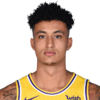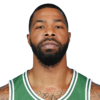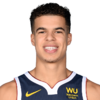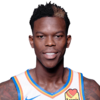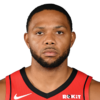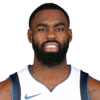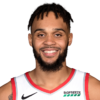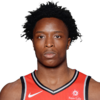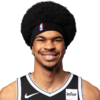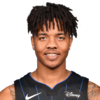
[ad_1]
Watch Now:
Reaction: Trail Blazers Earn Right To Play Lakers In First Round
(3:19)
When the NBA playoffs begin, the stars shine the brightest — but often it’s the supporting cast that can swing a series. Yes, Kawhi Leonard was brilliant for the world champion Toronto Raptors last postseason, but they likely wouldn’t have even made it to the Finals were it not for the heroics of Fred VanVleet. In 2011, inserting diminutive role player JJ Barea into the starting lineup alongside a transcendent Dirk Nowitzki was the final chess move that allowed the Dallas Mavericks to defeat LeBron James, Dwyane Wade, Chris Bosh and the Miami Heat for the title.
Superstars win championships, but they can’t do it without role players.
With the playoffs set to begin on Monday, we looked at each team’s biggest X-factor — that is, which non-star is most capable of swinging a series one way or another? It goes without saying that the stars have to play well in order to advance, but if these players also step up in a big way, it could mean a deeper playoff run for these teams.
Western Conference
Los Angeles Lakers
There isn’t much debate about Kuzma being the most important player on the Lakers outside of superstars LeBron James and Anthony Davis. James said as much after Kuzma’s game-winning 3-pointer against Denver on Monday:
“In order for us to win a championship, he has to be our third-best player,” James said of Kuzma. “If I’m struggling or if AD is struggling, he has to be our second-best player on any given night. We can’t win a championship if Kuz doesn’t play well.”
Offensively the statistics bear this out, with the Lakers going 12-3 when Kuzma scores 17 or more points this season. With the Lakers’ significant struggles putting points on the board since the restart (due in part to some awful games from Davis), Kuzma’s role becomes magnified heading into the postseason. Defensively, Kuzma has already taken great strides in the seeding games, which could allow Frank Vogel to play him comfortably at both the three and four during the playoffs.
Los Angeles Clippers
The Clippers are the deepest team in the NBA postseason, and they are rife with known commodities like Kawhi Leonard, Paul George, Lou Williams and Montrezl Harrell. When the Clippers out-maneuvered the Lakers to grab Morris before the trade deadline, some felt the move pushed the Clippers over the top in the battle for L.A., and possibly in the battle for the Larry O’Brien Trophy.
Morris has been up and down so far in his tenure with the Clippers, but the numbers bear out his importance. With Morris on the court, the Clippers have a net rating of plus-15.8, and without him their net rating plummets to minus-2.4. It’s a small sample size and his minutes are usually tied to at least one of Kawhi and George, but Morris has also thrived in non-Kawhi minutes — he’s shooting 52 percent from the field and 40 percent from 3-point range in 81 minutes with Leonard on the bench this season. This, along with his defense (the Clippers allow nearly seven fewer points per 100 possessions with Morris on the court), could be the key to their postseason success. Can Morris shoot well enough to provide an outlet for the Williams-Harrell pick-and-roll when Kawhi and/or George rests?
The Clippers won’t be sunk by any means if Morris isn’t hitting his shots, but if he thrives it certainly takes them to another level.
Denver Nuggets
Before the hiatus, the Nuggets’ biggest X-factor would have probably been Will Barton or Gary Harris. It goes without saying that Jamal Murray has to perform much more consistently than he did last postseason for the Nuggets to advance, but the bubble revelation of Porter Jr. has altered the Nuggets’ upside significantly.
A likely honoree on the All-Bubble team, Porter Jr. seized his opportunity with the depleted Denver roster, and the Nuggets have been 11.3 points per 100 possessions better with MPJ on the court in seeding games. Porter has proven that he can be the best scorer on the court for the Nuggets on any given night, but as a redshirt rookie he doesn’t have a proven track record heading into his first postseason. Therefore we don’t quite know what to expect, but we know if he’s at his best Porter is nearly impossible to stop offensively with his size and versatility.
Oklahoma City Thunder
It’s hard to call Schroder an “X-factor” since he’s been so good this season, but the fact that he left the bubble before games started for the birth of his second child and just returned on Tuesday means that he’ll have precious few days to get back into shape before being thrown into what should be a heated, intense series against the Rockets.
Schroder’s function is two-fold, serving as the floor leader of the Thunder’s second unit and a crucial member of the closing lineup alongside Chris Paul, Shai Gilgeous-Alexander, Danilo Gallinari and Steven Adams that has a ridiculous plus-35 net rating in 98 fourth-quarter minutes this season. Schroder averaged nearly 14 points per game for the Thunder in the playoffs last season but wasn’t efficient — they’re going to need him to get closer to this season’s 19-point average and 38 percent 3-point shooting if they’re going to keep pace with Houston and potentially beyond.
Houston Rockets
The Rockets went all-in on Gordon as the team’s third star by signing the 31-year-old to a four-year, $55 million contract extension (up to $76 million if he makes an All-Star team or Houston wins a title) before the season, but that deal has gotten off to a rocky start. Gordon has missed over half the season with various injuries and has not performed well when he has been on the court, averaging 14.5 points on 37 percent field goals and 31 percent 3-pointers — well under his career averages.
Gordon will get a ton of open looks next to James Harden and Russell Westbrook, so it’s somewhat concerning that he’s only averaging 0.884 points per possession on spot-up jumpers this season, good for the 32nd percentile in the league according to Synergy Sports Technology. Last postseason he averaged 1.139 points per possession on spot-ups, which was in the 85th percentile.
All this to say, the Rockets success or failure in this season’s playoffs might come down to whether Gordon can consistently make shots. He looks to be in great shape, but only has a couple of bubble games under his belt before being thrown into the postseason gauntlet.
Utah Jazz
This was going to be Mike Conley, but the absence of Bogdan Bogdanovic makes Conley essential, not simply an X-factor. Instead, we’ll go with Clarkson, who will have added offensive responsibility as one of the few Jazz players capable of creating his own shot on a consistent basis — and boy does he like to shoot. Now the question is, will those shots go in?
Clarkson is the definition of the heat-check guy off the bench, putting up 20 or more points as a reserve 19 times this season between Utah and Cleveland. But he’s also capable of throwing up some real clunkers, with games of 2-for-13, 4-for-14 and 4-for-17 already on the ledger as a member of the Jazz. Clarkson will likely be exploited defensively, so if he’s not scoring the Jazz will really struggle in non-Donovan Mitchell minutes. If he gets hot in four of the seven games, however, he just might swing a series in Utah’s direction.
Dallas Mavericks
A throw-in by the Knicks in the Kristaps Porzingis deal, Hardaway has become an important part of the Mavericks’ league-leading offense this season. He’s improved his 3-point shooting to nearly 40 percent, and has been absolutely elite in spot-up situations, averaging 1.274 points per possession (95th percentile), according to Synergy.
Part of Hardaway’s efficiency in this area comes from his ability to not only shoot 3s, but also to attack close-outs for either layups or pull-up jumpers (86th percentile on off-the-dribble jumpers, per Synergy).
This will prove necessary when Luka Doncic and Porzingis face more aggressive double-teams in the playoffs. Hardaway is more than capable of swinging a game or series, with 13 performances of 25 or more points this season.
Portland Trail Blazers
Those of us following the seeding games know all about the Portland Trail Blazers, so we have witnessed Trent’s breakout performance firsthand. In the absence of Trevor Ariza, Trent has taken advantage of his extra opportunity by going 34-for-67 from 3-point range in the bubble, trailing only teammate Damian Lillard for 3-point makes. If he makes shots at anywhere near this clip in the playoffs, the Blazers will be very difficult to stop offensively.
They’ll also need Trent to show up defensively, as one of the few reliable wings at Portland’s disposal — no offense to Mario Hezonja. The Blazers have been atrocious on defense in the bubble, but they’ve been much better with Trent on the court, giving up 127.4 points per 100 possessions with him on the bench, compared to 115.3 with Trent in the game.
Eastern Conference
Milwaukee Bucks
This is nothing new, as Bledsoe has been front and center in any discussion of Bucks playoff success since he signed a four-year, $70 million extension in March of 2019. His postseason performance last year (13.7 points, 41 percent shooting, 24 percent 3-pointers) left some wondering whether Milwaukee would suffer immediate buyer’s remorse, and those feelings were compounded when the Bucks let Malcolm Brogdon walk last summer.
Bledsoe has been essential to the Bucks this season on both ends of the floor, but he’s going to need to make shots in the postseason for it to mean anything to Milwaukee fans. He was particularly dreadful in the six-game loss to the Raptors in last year’s Eastern Conference finals, averaging just over 10 points per game and shooting a dismal 5-of-29 from 3-point range. Look at how much space Toronto defenders gave Bledsoe for wide-open 3s.
Playoff defenses loading up on Giannis Antetokounmpo and Khris Middleton will dare Bledsoe to shoot from distance, so he’s going to have to connect early and often for Milwaukee to reach its maximum potential.
Toronto Raptors
It’s hard to pick an X-factor on a team with so many consistent performers, and they’ll all need to contribute to make up for the absence of Kawhi Leonard’s postseason production. The least known commodity, partly due to the fact that he missed last year’s playoffs, is Anunoby. Toronto’s calling card is its relentless defense, where Anunoby will no doubt have his biggest impact as a long, athletic, switchable 6-7 wing — but he’s also made tremendous strides this year offensively, which could seriously increase the Raptors’ chances of repeating.
In a lineup full of shooters, Anunoby is the logical pick-your-poison choice for defenses to leave open, but he’s connected on 39 percent of his 3-pointers this season (up from 33 last season), including 40 percent from the coveted corner 3. He’s averaging a solid 1.136 points per possession in catch-and-shoot situations this season, per Synergy, after averaging just 0.924 points per possession in those same situations last year. He’s also athletic enough to attack the rim and playmaker on hard close-outs when the defense over-extends.
If Anunoby can be a true offensive weapon then there are really no weak spots in the Raptors lineup. He made 45 percent of his 3-pointers in 10 games during the 2017-18 postseason, so he has a history of thriving when it counts.
Boston Celtics
It sounds weird saying that four-time All-Star and All-NBA point guard Kemba Walker is an X-factor, but his nagging knee injury has led to understandable questions about how he’ll perform in the postseason. Walker’s injury at the beginning of February coincided with Jayson Tatum establishing himself as the true No. 1 option, and since then Walker has averaged 15.6 points and four assists on 37 percent field goals and 35 percent 3-pointers in 14 games.
If Walker is himself, he can be a devastating playoff scorer with the ability to create his own offense. But if he’s hampered or struggles to find a way to be efficient alongside Tatum, he becomes a defensive liability (given his size) who isn’t making up for it on the other end. The Celtics have enough weapons on both sides of the ball to advance to the NBA Finals, but they’re going to need Walker to be healthy and effective.
Indiana Pacers
At his best, Turner is a mobile, rim-protecting 7-footer capable of stretching the defense with his 3-point prowess on the other end. We just don’t get to see his best as often as the Pacers would like — but they’ll need it this postseason. Turner’s numbers were down across the board this season in slightly more minutes per game, partly due to the emergence of Domantas Sabonis, who is expected to miss the remainder of the season with a foot injury.
That means Turner will need to step up around Victor Oladipo, Malcolm Brogdon and the suddenly unstoppable TJ Warren. Turner’s shooting 34 percent from 3-point range this season, with a decent 1.008 points per possession on catch-and-shoots, per Synergy, but often gets lost offensively and disappears for stretches — he scored fewer than 10 points in 24 games this season. More concerning for the Pacers is that his rim protection has dropped off, allowing one point per possession around the rim (65th percentile) compared to 0.87 (89th percentile) last season, according to Synergy.
Indiana needs Turner to be consistently engaged defensively, rebound and avoid foul trouble — when he does those things he’s borderline elite on that end. He’s also capable of putting up a big number or two offensively over the course of a series, which the Pacers might need if they’re going to advance.
Miami Heat
Ask Steve Kerr how valuable Iguodala was to the Warriors‘ run of five straight NBA Finals appearances, and you’ll understand why he’s a major wild card for the Heat. Never one to put up gaudy stats, Iguodala may find himself getting a large share of postseason minutes given the inexperience of rotation players Kendrick Nunn, Duncan Robinson, Tyler Herro and Derrick Jones. Iguodala’s track record speaks for itself, but it’s hard to gauge because the 36-year-old has only played 21 games this season after sitting out most of the year.
He looks to be in peak physical condition (when is he not?), and his combination of perimeter defense, basketball IQ, ball-handling acumen and clutch shot-making may prove the difference for Miami in at least one series … maybe more.
Philadelphia 76ers
This was supposed to be Shake Milton’s spot, but he struggled during the seeding games, averaging 9.3 points on 43 percent shooting and 35 percent 3-pointers. At this point, Burks seems like a more reliable offensive contributor with the ability to get his own shot and knock down open 3s (57 percent on four attempts per game in the bubble). He’s a bucket-getter, but also has playmaking skills, something the Sixers will desperately need without the services of Ben Simmons.
Burks is a veteran who performed well in limited playoff minutes two seasons ago with the Jazz. There will be times, particularly when Joel Embiid and/or Tobias Harris rest, that Philly will simply need someone to create offense. Burks is more than capable of doing that, and if he does, it could improve what looks like a dire playoff outlook for the 76ers.
Brooklyn Nets
The Nets are going to have trouble scoring against the Raptors’ tenacious defense, so their only chance of winning the series is to limit Toronto offensively — that’s where Allen comes in. You’ve seen the highlight blocks, but Allen has just been so-so as a rim protector this season (33rd percentile per Synergy) and has been consistently toasted in the pick-and-roll. With the way the Raptors execute and move the ball, Allen will need to be in top form and stay out of foul trouble with a thin roster behind him.
Offensively, Allen’s job will be to occasionally outrun Marc Gasol down the court to either pick up an easy dunk or force some disarray from the Raptors defense. He’s also a terror on the offensive glass (10th in the league at 3.1 per game), so the Nets will need him to generate second chance opportunities. It’s unlikely that Allen will allow Brooklyn to pull off the major upset, but the only way they could possibly do it is if he has a series to remember.
Orlando Magic
With Jonathan Isaac out for the foreseeable future, the X-factor baton gets passed to Fultz, who has shown flashes of dynamic brilliance throughout the season. The 23rd-ranked Magic offense has struggled all year, which doesn’t bode well for a matchup against the league’s best defense. Fultz is a menace in transition (92nd percentile at 1.612 points per possession, including assists, according to Synergy), and despite his wild journey of shot mechanics, he made 42 percent of his mid-range jumpers this season, according to NBA.com, putting him on par (at least percentage-wise) with players like Bradley Beal and Kawhi Leonard.
He’s also an excellent finisher around the rim, shooting 62 percent in the restricted area, which puts him just outside the top 10 among NBA guards. In a series where the Magic are likely going to struggle to put the ball in the basket, Fultz might be their best option to create quick and easy offense.
[ad_2]
Source link
